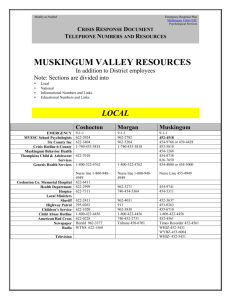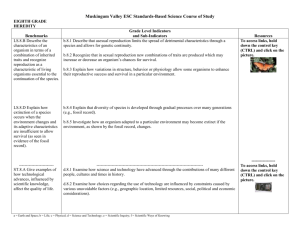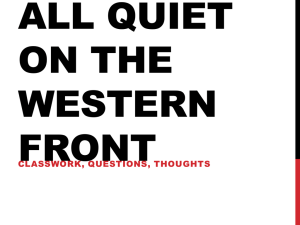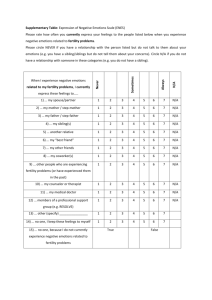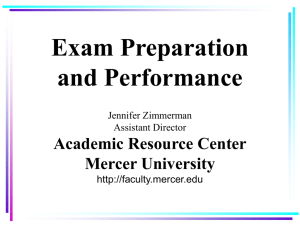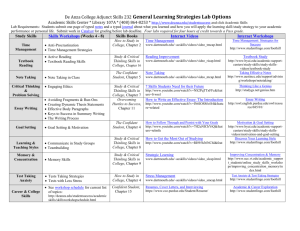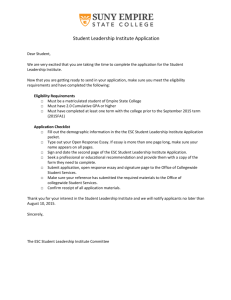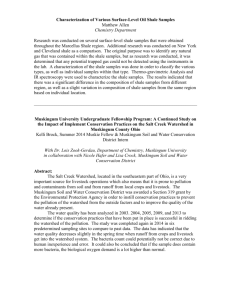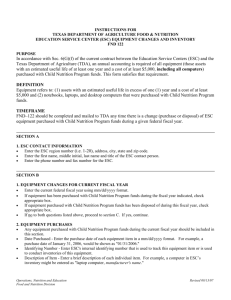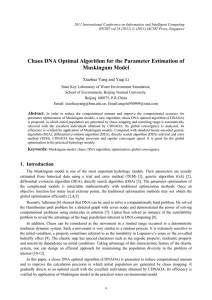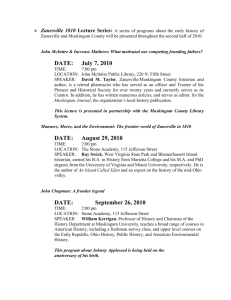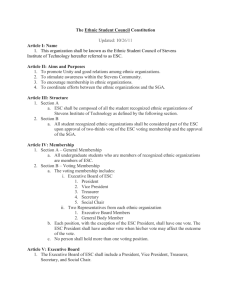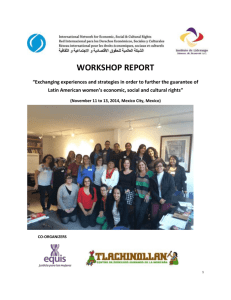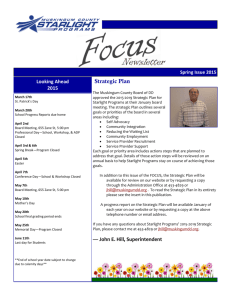Classroom Activities
advertisement
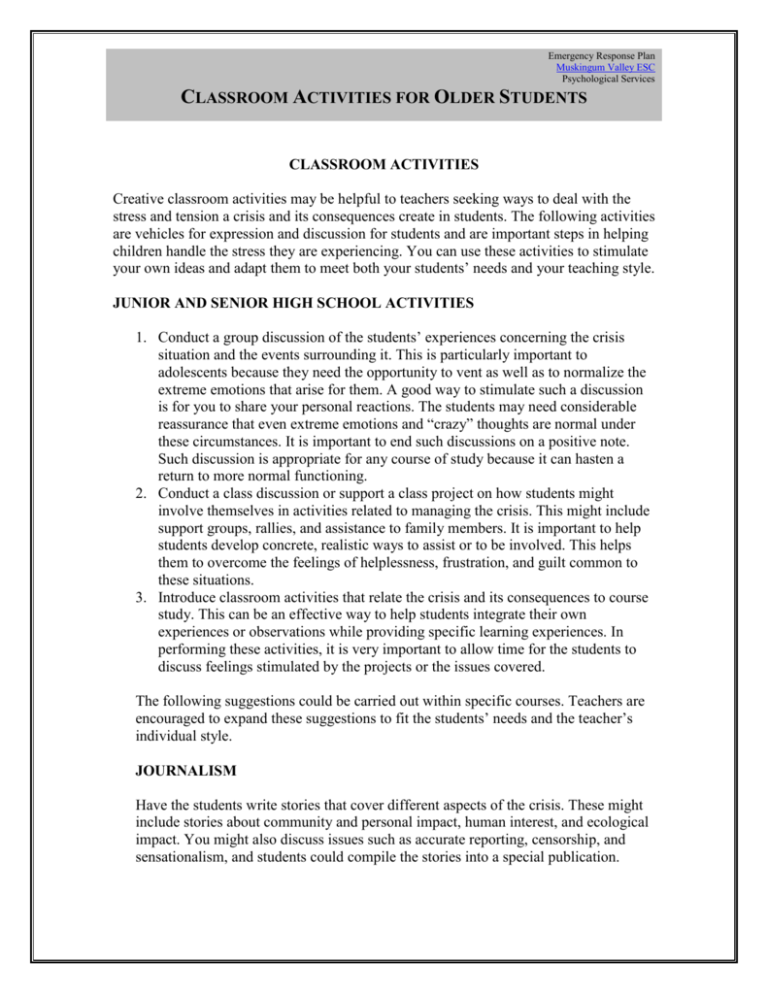
Emergency Response Plan Muskingum Valley ESC Psychological Services CLASSROOM ACTIVITIES FOR OLDER STUDENTS CLASSROOM ACTIVITIES Creative classroom activities may be helpful to teachers seeking ways to deal with the stress and tension a crisis and its consequences create in students. The following activities are vehicles for expression and discussion for students and are important steps in helping children handle the stress they are experiencing. You can use these activities to stimulate your own ideas and adapt them to meet both your students’ needs and your teaching style. JUNIOR AND SENIOR HIGH SCHOOL ACTIVITIES 1. Conduct a group discussion of the students’ experiences concerning the crisis situation and the events surrounding it. This is particularly important to adolescents because they need the opportunity to vent as well as to normalize the extreme emotions that arise for them. A good way to stimulate such a discussion is for you to share your personal reactions. The students may need considerable reassurance that even extreme emotions and “crazy” thoughts are normal under these circumstances. It is important to end such discussions on a positive note. Such discussion is appropriate for any course of study because it can hasten a return to more normal functioning. 2. Conduct a class discussion or support a class project on how students might involve themselves in activities related to managing the crisis. This might include support groups, rallies, and assistance to family members. It is important to help students develop concrete, realistic ways to assist or to be involved. This helps them to overcome the feelings of helplessness, frustration, and guilt common to these situations. 3. Introduce classroom activities that relate the crisis and its consequences to course study. This can be an effective way to help students integrate their own experiences or observations while providing specific learning experiences. In performing these activities, it is very important to allow time for the students to discuss feelings stimulated by the projects or the issues covered. The following suggestions could be carried out within specific courses. Teachers are encouraged to expand these suggestions to fit the students’ needs and the teacher’s individual style. JOURNALISM Have the students write stories that cover different aspects of the crisis. These might include stories about community and personal impact, human interest, and ecological impact. You might also discuss issues such as accurate reporting, censorship, and sensationalism, and students could compile the stories into a special publication. Emergency Response Plan Muskingum Valley ESC Psychological Services CLASSROOM ACTIVITIES FOR OLDER STUDENTS SCIENCE Discuss the scientific aspects of the crisis, such as weapons and their destructive power, research, impact of the weather, environmental impact, and impact on the school. Suggest a project about stress involving the physiological responses to stress and methods of dealing with it. ENGLISH COMPOSITION Have the students write about their own experiences, or those of persons close to them, regarding the crisis and the problems associated with it. You might discuss composition issues, such as the problems that arise in conveying heavy emotional tone without being overly dramatic. LITERATURE Have students report on crises that have occurred in mythology or that appear in American and British fiction and poetry. PSYCHOLOGY Have the students apply what they have learned in the course to the emotions, behaviors, and stress reactions they felt or observed in response to the crisis. Cover posttraumatic stress syndrome as appropriate. Present a guest speaker from the mental health profession who may be involved in working with families affected by the crisis or with support groups. Have students discuss, from their own experience, what has helped them most in dealing with crisis-related stress. Have the students develop a mental health education brochure in which they discuss emotional and behavioral reactions to crisis and the things that are helpful in coping. Have students conduct a survey among their parents and friends about how the crisis affected each of them and how they reacted psychologically. PEER COUNSELING Provide special information on common responses to the onset of the crisis and the consequences associated with it. Encourage the students to help each other integrate their own experiences. HEALTH Discuss emotional reactions to crisis and the importance of taking care of one’s own emotional and physical well-being. Discuss health implications of crisis, including food, water, physical and mental wounds, exposure to the elements, and other health precautions and safety measures. Discuss the effects of adrenaline on the body during stress and danger. A public health or mental health professional could be invited to speak to the class. Maintaining health, from the viewpoints of all those involved in or affected by the crisis, might be a valuable discussion topic. Emergency Response Plan Muskingum Valley ESC Psychological Services CLASSROOM ACTIVITIES FOR OLDER STUDENTS ART Have the students portray the crisis and their concerns about it in various art media. Students can do this individually or as a group. SPEECH AND DRAMA Have the students portray the emotions, feelings, and stresses that have arisen in response to the crisis and the effects of the crisis on each of them. Ask students to develop a skit or play on some aspect of the crisis. Stage a debate about whether women or men are better prepared psychologically to handle the stress of a crisis such as the one the students experienced. MATHEMATICS Have the class solve mathematical problems related to the impact of the crisis. CIVICS AND GOVERNMENT Study governmental agencies responsible either directly or indirectly for causing or supporting the crisis and their response to the crisis. Discuss how these agencies work and the political implications and impact of each agency. Examine various community systems and how the stress of the crisis has affected them. Have the students invite a local government official to class to discuss how the crisis has affected the community. Encourage the students to become aware of current and pending legislation relating to the crisis, should such legislation exist, and the implications of this legislation on them and on their families. HISTORY Have the students report on crises that have occurred both around the world and in the geographical location of the current crisis. What lessons can and have been learned that could benefit us and our community in the future? Emergency Response Plan Muskingum Valley ESC Psychological Services CLASSROOM ACTIVITIES FOR OLDER STUDENTS
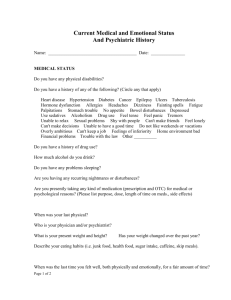
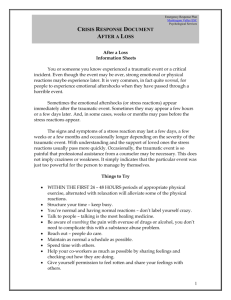
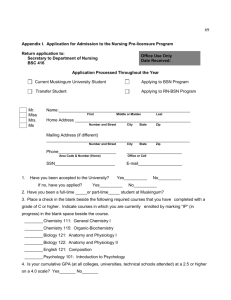
![Time Management [PPT] - University of North Alabama](http://s2.studylib.net/store/data/005233094_1-fdb38f711682ec0557e96ef203e508a9-300x300.png)

